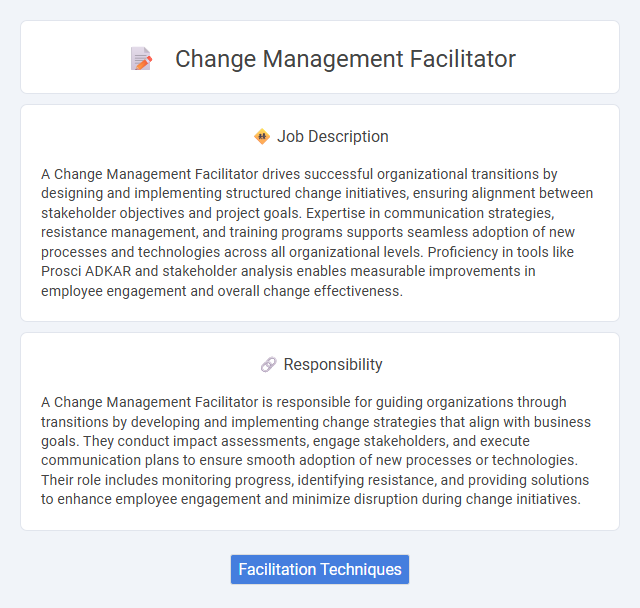
A Change Management Facilitator drives successful organizational transitions by designing and implementing structured change initiatives, ensuring alignment between stakeholder objectives and project goals. Expertise in communication strategies, resistance management, and training programs supports seamless adoption of new processes and technologies across all organizational levels. Proficiency in tools like Prosci ADKAR and stakeholder analysis enables measurable improvements in employee engagement and overall change effectiveness.
Individuals who thrive as Change Management Facilitators are likely those with strong interpersonal skills, resilience, and adaptability in dynamic environments. People comfortable with ambiguity and able to guide others through uncertainty may find this role well-suited to their capabilities. Those who struggle with frequent change or lack communication proficiency might face challenges fulfilling the responsibilities effectively.
Qualification
A Change Management Facilitator must possess strong expertise in organizational change principles, including proficiency in change impact analysis, stakeholder engagement, and resistance management. Certification in change management methodologies such as Prosci or ACMP is highly valued, alongside excellent communication and leadership skills to effectively guide teams through transitions. Advanced knowledge of project management tools and data-driven decision-making further enhances the facilitator's ability to drive successful change initiatives.
Responsibility
A Change Management Facilitator is responsible for guiding organizations through transitions by developing and implementing change strategies that align with business goals. They conduct impact assessments, engage stakeholders, and execute communication plans to ensure smooth adoption of new processes or technologies. Their role includes monitoring progress, identifying resistance, and providing solutions to enhance employee engagement and minimize disruption during change initiatives.
Benefit
A Change Management Facilitator likely improves organizational adaptability by guiding teams through transitions, which may enhance employee engagement and reduce resistance to change. Their expertise could increase the probability of successful project implementation by aligning stakeholders and managing expectations. Employing such a facilitator often results in smoother processes and potentially faster achievement of strategic goals.
Challenge
Navigating resistance to change often presents one of the greatest challenges for a Change Management Facilitator, requiring them to employ strategic communication and empathy to gain stakeholder buy-in. There is a probability that unforeseen obstacles, such as cultural barriers and conflicting priorities, might hinder the smooth implementation of change initiatives. Success in this role likely depends on the facilitator's ability to anticipate and adapt to these challenges while maintaining momentum toward organizational goals.
Career Advancement
A Change Management Facilitator plays a critical role in guiding organizations through transitions by assessing impact, developing communication strategies, and training stakeholders on new processes. Mastery in stakeholder engagement, data-driven change models, and effective communication enhances opportunities for promotion into senior project management or organizational development roles. Continuous skill development in digital transformation tools and leadership increase career growth potential within various industries focused on adaptive change initiatives.
Key Terms
Facilitation Techniques
A Change Management Facilitator employs advanced facilitation techniques such as workshops, focus groups, and stakeholder interviews to guide organizations through change processes effectively. Utilizing tools like SWOT analysis, mind mapping, and scenario planning enables the facilitator to surface challenges and align teams on strategic objectives. Mastery in conflict resolution and active listening supports stakeholder engagement and fosters a collaborative environment essential for successful change adoption.
 kuljobs.com
kuljobs.com